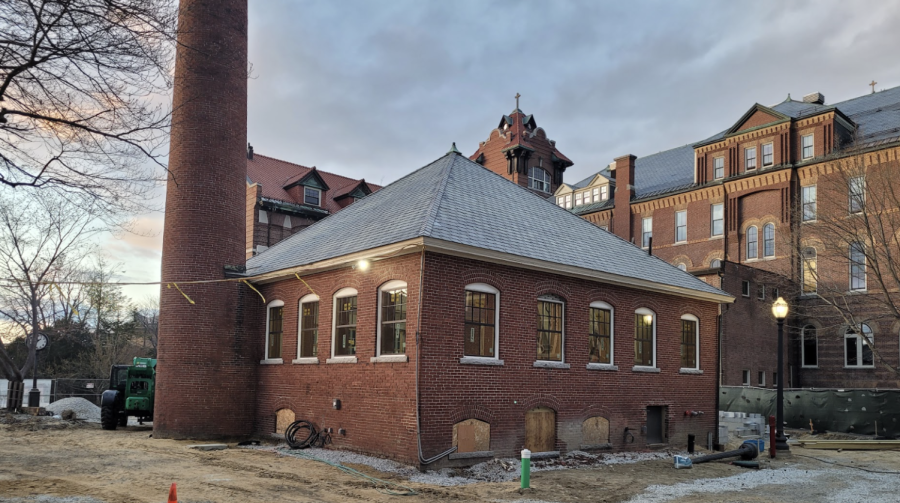Citizenship hinges on the Liberal Arts
Promoting study of the liberal arts is key to the mission of Saint Anselm College, and essential to creating well-rounded citizens. (Courtesy / James Lacefield)
April 20, 2023
In the last few issues of the Crier, there have been several pieces pertaining to the liberal arts. The consensus seems to be that the liberal arts are dwindling and that the college itself has created a commission to reinvigorate interest in liberal learning. While schools can do more to market the liberal arts, it is imperative that students understand the richness of the liberal learning tradition. The liberal arts are not useless, but are a tool for students to understand the many facets to life’s problems. The liberal arts have been and remain the best guide for thinking critically, problem solving, and living a good life.
The liberal arts date back to ancient times, but, for the sake of brevity, I will begin with the Middle Ages. In the Medieval Ages, the liberal arts were broken into two curricula: the trivium (grammar, rhetoric, and logic), and the quadrivium (arithmetic, geometry, astronomy, and music). Anyone who attended the first Conversatio lecture should recall this information. This learning tradition was meant to teach people how to teach people how to think and to use various different approaches to solving problems.
Throughout the Medieval Ages and the Renaissance, the liberal arts education continued to grow in popularity with a rebirth in music, art, and literature. By the 1600s, the Enlightenment was in season, which thus began a study of philosophy and politics based on human reason, not on religion. These subjects were examined in universities across Europe and led to great artistic and philosophical contributions, which are still studied today for their wisdom and beauty. However, after the Enlightenment, the interest in the liberal arts steadily declined. I am not claiming that people immediately wrote off the liberal arts, but the onset of the Industrial Revolution in the late 18th century certainly changed society from one of thought to one of action. In short, the societal mindset began to shift towards securing production and capital at the expense of leisure. Thus, the liberal education began to sink into irrelevancy. While the liberal arts have had revivals over time, they are in dire need of saving today.
The liberal arts help a society to cultivate an interest in many areas and to make sense of their liberty. In our modern epoch, we laud the idea of liberty in the abstract, but we dismiss the liberal arts, which are meant to shine a light on how to use that liberty. It is not that a farmer needs to read Aristotle or Kant, but reading them might lend an understanding of his duties as a citizen and how he should conduct his personal life. It is not that an accounting major needs to study the Fall of Rome, but the lessons from its study are not exclusive to any particular person or profession. These works help all citizens learn how to lead morally upright lives and why society functions the way it does. The study of history is imperative if we are to avoid making the same faux pas of our ancestors. The liberal arts are not a bunch of “requirements,” but, rather, a great lens for examining all societal and cultural issues.
When a society rejects liberal learning, it turns into the chaos we see today. Citizens have made a mockery of their liberty and mistaken licentiousness as their right and duty. The rejection of morally objective thought is dismissed, and a wave of “finding your own truths” is thus inaugurated. In Shakespeare’s Hamlet, the king’s advisor Polonius famously advises his son “to thine own self be true.” We are living in the age of Polonius, and we too shall end up getting cut by a sword if we are to continue on this perilous trek. Modern society is a thoughtless society, one which merely seeks to know without a teleological desire to apply knowledge. In layman’s terms, our society is one which simply wants to quickly download information for its own sake without any intent to use that information for a higher purpose, such as for the sake of pursuing virtue or for informing their political consciousness. The introduction of technology has certainly accentuated this trend in knowing without understanding. In the halcyon days of the past, one would have to go to a library to acquire knowledge, but now one has any and all information they need and want at their fingertips.
I am not here to bemoan modern problems, but rather propose a simple solution to them. There must be a reinvigoration of the liberal arts education. We must understand our liberty, our role in society, and how to learn–not simply process information. The American academic Charles William Eliot put it best when he said “The fruit of liberal education is not learning, but the capacity and desire to learn; not knowledge, but power.”



